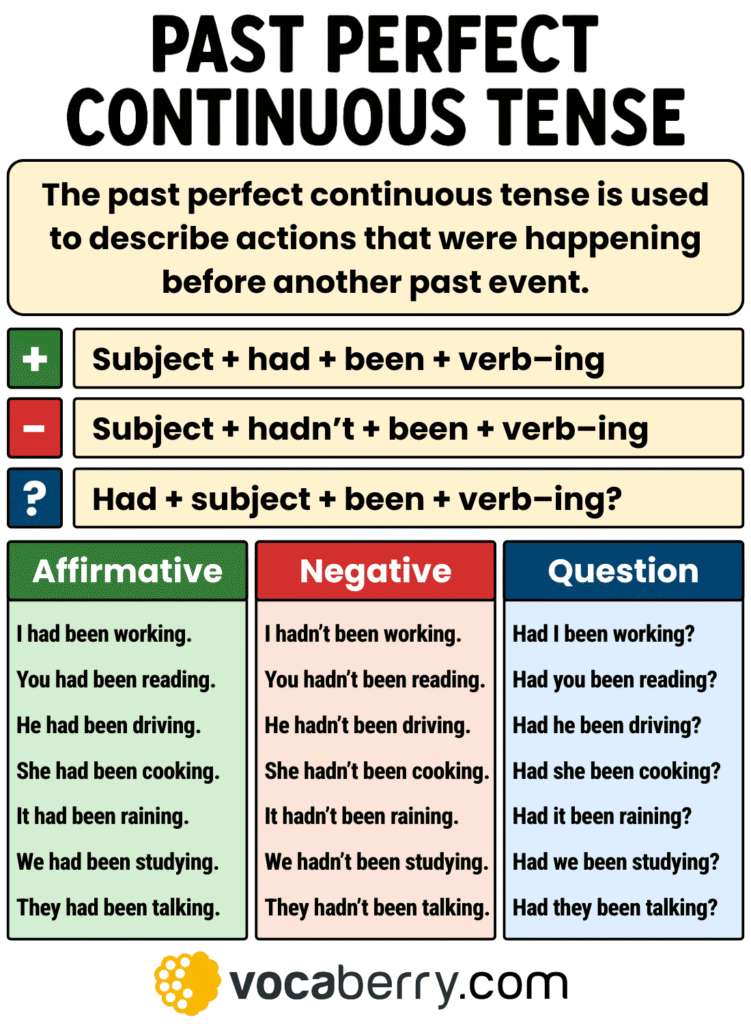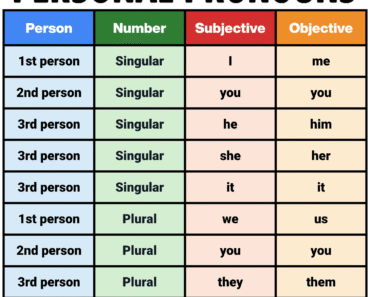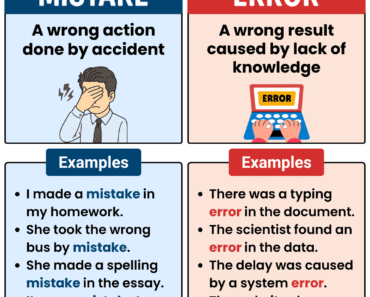
The past perfect continuous tense (also called the past perfect progressive) describes actions that were ongoing before another action or time in the past. It shows how long something had been happening up to a specific moment.
In this guide, you’ll learn how to form and use the past perfect continuous tense in affirmative, negative, and question forms, understand its structure and usage, review essential grammar rules, and explore common time expressions—with clear examples.
When to Use the Past Perfect Continuous Tense
The past perfect continuous tense is used to talk about actions or situations that were happening over a period of time before another event in the past. It emphasizes the duration, continuity, or ongoing nature of an activity. Here are the most common uses:
1. Actions Continuing Up to a Past Moment
Use this tense to describe something that had been happening and stopped just before another past action.
Examples:
- She had been working all morning before the meeting started.
- I had been studying for hours when you called.
- They had been arguing before the manager arrived.
2. Showing the Duration of a Past Activity
Use it to highlight how long something had been happening in the past.
Examples:
- He had been living abroad for ten years before he moved home.
- We had been waiting for over an hour before the bus finally came.
- She had been feeling sick for days before she saw a doctor.
3. Explaining the Cause of a Past Situation
Use this tense to show why something happened or explain a visible result.
Examples:
- She was tired because she had been working late all week.
- His clothes were wet because he had been walking in the rain.
- They were happy because they had been planning the trip for months.
Past Perfect Continuous Tense Structure
The past perfect continuous tense is formed using had been + present participle (verb + -ing). This structure is the same for all subjects and is used in affirmative, negative, and question sentences.
Below you’ll find clear forms, examples, and a helpful summary table.
Affirmative Form
Used to state that an action was in progress over a period of time before another past event.
Structure: Subject + had been + verb-ing
Examples:
- She had been working all day before the meeting.
- I had been studying for hours.
- They had been traveling before the lockdown.
Negative Form
Used to show that an action had not been happening up to a certain point in the past.
Structure: Subject + had not (hadn’t) been + verb-ing
Examples:
- I hadn’t been sleeping well before the vacation.
- He had not been exercising regularly.
- We hadn’t been talking for long when you arrived.
Question Form
Used to ask whether an action had been happening before another event or time.
Structure: Had + subject + been + verb-ing?
Examples:
- Had you been waiting long before I came?
- Had she been working there for years?
- Had they been planning the event together?
Short Answers
Used to give clear yes/no replies about whether the action was happening.
Examples:
- Had you been studying? ➜ Yes, I had. / No, I hadn’t.
- Had she been working? ➜ Yes, she had. / No, she hadn’t.
- Had they been waiting? ➜ Yes, they had. / No, they hadn’t.
Summary Table: Past Perfect Continuous Tense
| Form | Structure | Example |
|---|---|---|
| Affirmative | Subject + had been + verb-ing | She had been reading the book. |
| Negative | Subject + hadn’t been + verb-ing | I hadn’t been feeling well. |
| Question | Had + subject + been + verb-ing? | Had you been working all day? |
| Short Answer | Yes/No + subject + had/hadn’t | Yes, I had. / No, they hadn’t. |
Past Perfect Continuous – Time Expressions
Time expressions help show how long an action had been happening before another past event. They often emphasize duration and make your sentences clearer.
Below are the most common time expressions used with this tense:
| Time Expression | Example Sentence |
|---|---|
| for | She had been studying for three hours before dinner. |
| since | They had been living there since 2005. |
| before | I had been working hard before the project ended. |
| until | He had been waiting until she arrived. |
| all day / all week | We had been cleaning all day when the guests came. |
| by the time | By the time I called, she had been sleeping for hours. |






